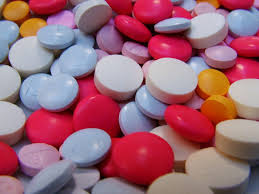Symptom Finder - Obesity
OBESITY
The differential diagnosis of obesity, like that of weight loss, is best developed using physiology because most cases of obesity are caused by an absolute increased intake of calories or a relative increased intake of calories over output of energy. Fluid retention may also be associated with weight gain.
Increased intake of calories: This type of obesity is due to an increased appetite. Under this heading are idiopathic obesity, psychogenic obesity, hypothalamic obesity (due to pituitary tumors and other lesions affecting the hypothalamus), islet cell adenomas and carcinomas (causing hypoglycemia and, consequently, a big appetite), early stages
of diabetes mellitus when functional hypoglycemia is common, Cushing syndrome and exogenous corticosteroids (which increase appetite), and alcoholism, which not only stimulates the appetite but also adds calories in the alcohol (up to 250 calories per cocktail).
Polycystic ovary syndrome causes increased appetite, but the hirsutism is a dead giveaway.
Decreased output of energy: Under this heading should be listed hypothyroidism and possibly hypogonadism (such as Klinefelter syndrome), where the motivation to work or exercise may be impaired.
Mild pituitary insufficiency (as in Sheehan or Fröhlich syndrome) may also cause obesity by this mechanism. A primary growth hormone deficiency in adults may cause obesity. This type of obesity may be occupational (e.g., white-collar workers) or environmental (i.e., watching television all day).
“Obesity” due to fluid retention: This increase is in reality an increase in weight from fluid retention. Inappropriate antidiuretic hormone syndromes such as those that occur in carcinoma of the lung, hypothalamic lesions, and drugs are the most important obscure causes. Congestive heart failure, nephrosis, cirrhosis, beriberi, and myxedema rank as significant among the obvious causes.
Miscellaneous causes: Heredity is a cause of obesity, but the physiologic mechanism is uncertain. Several drugs may cause obesity including corticosteroids, tricyclic antidepressants, selective serotonin reuptake inhibitors, oral contraceptives, and estrogen.
Approach to the Diagnosis
It would be ridiculous to do a complete endocrine workup on every case of obesity, but thyroid function studies may be worthwhile. Patients who fail to lose weight on a strict diet may require hospitalization with observation. If they still fail to lose weight, a complete endocrine workup would seem to be indicated.
Other Useful Tests
1. 48-hour fast with glucose monitoring (insulinoma)
2. Plasma insulin (insulinoma)
3. C-peptide (insulinoma)
4. Serum cortisol (Cushing syndrome)
5. Dexamethasone suppression test (Cushing syndrome)
6. Pelvic sonogram (polycystic ovary)
7. Chromosomal analysis (Klinefelter syndrome)
8. Psychiatry consult
The differential diagnosis of obesity, like that of weight loss, is best developed using physiology because most cases of obesity are caused by an absolute increased intake of calories or a relative increased intake of calories over output of energy. Fluid retention may also be associated with weight gain.
Increased intake of calories: This type of obesity is due to an increased appetite. Under this heading are idiopathic obesity, psychogenic obesity, hypothalamic obesity (due to pituitary tumors and other lesions affecting the hypothalamus), islet cell adenomas and carcinomas (causing hypoglycemia and, consequently, a big appetite), early stages
of diabetes mellitus when functional hypoglycemia is common, Cushing syndrome and exogenous corticosteroids (which increase appetite), and alcoholism, which not only stimulates the appetite but also adds calories in the alcohol (up to 250 calories per cocktail).
Polycystic ovary syndrome causes increased appetite, but the hirsutism is a dead giveaway.
Decreased output of energy: Under this heading should be listed hypothyroidism and possibly hypogonadism (such as Klinefelter syndrome), where the motivation to work or exercise may be impaired.
Mild pituitary insufficiency (as in Sheehan or Fröhlich syndrome) may also cause obesity by this mechanism. A primary growth hormone deficiency in adults may cause obesity. This type of obesity may be occupational (e.g., white-collar workers) or environmental (i.e., watching television all day).
“Obesity” due to fluid retention: This increase is in reality an increase in weight from fluid retention. Inappropriate antidiuretic hormone syndromes such as those that occur in carcinoma of the lung, hypothalamic lesions, and drugs are the most important obscure causes. Congestive heart failure, nephrosis, cirrhosis, beriberi, and myxedema rank as significant among the obvious causes.
Miscellaneous causes: Heredity is a cause of obesity, but the physiologic mechanism is uncertain. Several drugs may cause obesity including corticosteroids, tricyclic antidepressants, selective serotonin reuptake inhibitors, oral contraceptives, and estrogen.
Approach to the Diagnosis
It would be ridiculous to do a complete endocrine workup on every case of obesity, but thyroid function studies may be worthwhile. Patients who fail to lose weight on a strict diet may require hospitalization with observation. If they still fail to lose weight, a complete endocrine workup would seem to be indicated.
Other Useful Tests
1. 48-hour fast with glucose monitoring (insulinoma)
2. Plasma insulin (insulinoma)
3. C-peptide (insulinoma)
4. Serum cortisol (Cushing syndrome)
5. Dexamethasone suppression test (Cushing syndrome)
6. Pelvic sonogram (polycystic ovary)
7. Chromosomal analysis (Klinefelter syndrome)
8. Psychiatry consult

